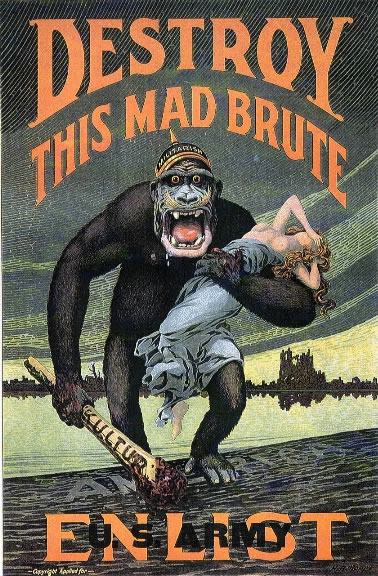A. War and the National Interest--nations fight wars because they see them serving a particular national interest
1. Convincing the American People--the Wilson administration had to put a great deal of effort to sell the war to the American people, both with propaganda and with severe punishment for speaking against the war effort.
2. Speaking Out in Opposition--before war was actually declared, there was a great deal of opposition to the United States becoming involved in the "entangling alliances" that led Europeans to butcher one another. A number of Americans outside of government spoke out in opposition to the war, and continued to speak against it despite the US government's limitation of free speech through the passage of the Espionage Act in 1917, and which was further amended by the Sedition Act in 1918, which outlawed speech that could be construed as "aiding and abetting" enemies of the United States.
The jingoism, or super-patriotism, stirred by government propaganda, the perceived need to pull together during a time of national crisis, led to the severe repression of those institutions and persons perceived as not fully supporting the war effort.
B. Fighting for Free Speech--despite the efforts on the part of the government, and the repression when propaganda did not work, some people continued to speak out in opposition to the war.
1. Industrial Workers of the World (IWW)--or the "'Wobblies, were the largest group to continue to speak out against involvement in what they called a "capitalist war." IWW members were not only arrested for speaking out against the war, however; they were also arrested for attempting to organize workers into the organization itself. The IWW, unlike the trade unions that made up the membership of the American Federation of Labor (AFL), was at war with the capitalist system--to the extent that, as a labor union, they refused to sign contracts with employers that would solidify the gains made by organizers and members in the stuggle with employers. For the IWW, this would mean having the expectation that management would still be around to negotiate with at the end of the contract.
The two clips shown in class are from the documentary The Wobblies (1979). Portions can be viewed below:
and


No comments:
Post a Comment